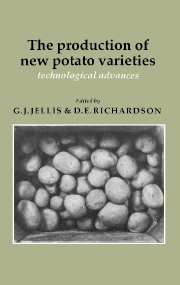Book contents
- Frontmatter
- Contents
- List of contributors
- Preface
- Editors' note and acknowledgements
- Introduction
- The development of potato varieties in Europe
- Genetic Resources
- Breeding Strategies
- Selection and Screening Methods
- Variety Assessment
- Potato variety assessment in the Federal Republic of Germany
- Potato variety assessment in France
- Variety assessment in The Netherlands
- Potato variety assessment in Poland
- Potato variety assessment in the UK
- Use of common origin seed for potato trials
- Micropropagation – an aid in the production of new varieties
- Testing potato varieties for response to drought and irrigation
- Testing varieties for resistance to and tolerance of Globodera pallida
- Testing for glycoalkaloids
- Methods for calculating 1–9 values to express the resistance of potato varieties to diseases
- Establishing standards in variety assessment
- Consumer quality requirements in the United Kingdom
- The effects of fertilizer treatments on a range of old and new early-maturing potato varieties
- Variety trials in Egypt, with special reference to dormancy
- Semi-conventional Breeding Methods
- True Potato Seed
- Unconventional Breeding Methods
- Commentary
- Index
Potato variety assessment in Poland
Published online by Cambridge University Press: 05 March 2012
- Frontmatter
- Contents
- List of contributors
- Preface
- Editors' note and acknowledgements
- Introduction
- The development of potato varieties in Europe
- Genetic Resources
- Breeding Strategies
- Selection and Screening Methods
- Variety Assessment
- Potato variety assessment in the Federal Republic of Germany
- Potato variety assessment in France
- Variety assessment in The Netherlands
- Potato variety assessment in Poland
- Potato variety assessment in the UK
- Use of common origin seed for potato trials
- Micropropagation – an aid in the production of new varieties
- Testing potato varieties for response to drought and irrigation
- Testing varieties for resistance to and tolerance of Globodera pallida
- Testing for glycoalkaloids
- Methods for calculating 1–9 values to express the resistance of potato varieties to diseases
- Establishing standards in variety assessment
- Consumer quality requirements in the United Kingdom
- The effects of fertilizer treatments on a range of old and new early-maturing potato varieties
- Variety trials in Egypt, with special reference to dormancy
- Semi-conventional Breeding Methods
- True Potato Seed
- Unconventional Breeding Methods
- Commentary
- Index
Summary
The potato crop is of great economic importance in Poland. The area of land under potatoes is 2.2 million ha, which is about 15% of total arable land. This is due to the predominance of light soils (nearly 60% of total land) and suitable natural conditions for potato growing. Total annual potato production is 40 to 50 million tonnes. About 55% of total production is for fodder, mainly for pigs, and nearly 12% is used for domestic consumption. Potato is almost the only raw material available for alcohol and starch production. Considerable efforts are being made to increase exports and usage for industrial processing, i.e. alcohol, starch and especially dried food production.
During the next few years the area under potato is expected to decrease, but the average potato yield is expected to increase. The introduction of new, more valuable varieties is one of the main factors leading to the increase of yield.
The breeding of new potato varieties in Poland is coordinated by the Institute for Potato Research at Bonin, which has four Experimental Stations. Another five Plant Breeding Stations belong to the Association of Plant Breeding and Seed Production Enterprises. Preliminary trials are carried out at five or six centres over 3 years before official trials.
Official variety assessment has a long tradition in Poland. Since 1969, it has been the responsibility of the Research Centre for Cultivar Testing (COBORU) at Slupia Wielka.
- Type
- Chapter
- Information
- The Production of New Potato VarietiesTechnological Advances, pp. 131 - 134Publisher: Cambridge University PressPrint publication year: 1987



